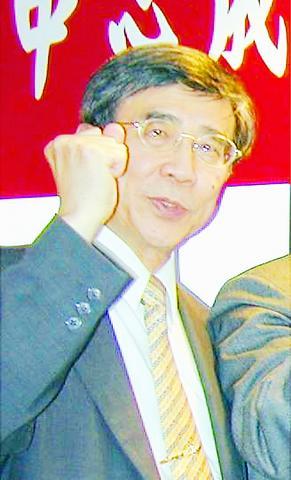A command center was put into commission yesterday by the Taichung City Government to integrate medical resources in the central part of the country to best prevent large-scale SARS infections from happening in the region.
The Executive Yuan's anti-SARS campaign leader Lee Ming-liang (
"We will try to prevent the area surrounding Taichung from falling victim to SARS. The disease might spread to the region from Kaohsiung or Taipei," Lee said.

PHOTO: XU XIA-LIAN, TAIPEI TIMES
"Even if the worst happens, we now have the faculty to handle it," he said.
The command center has power to control distribution of medical resources in the central region, which includes five municipalities and counties.
The head of the center is China Medical College Chairman Tsai Chang-hai (蔡長海), who was selected for the position for his active participation in the prevention of SARS in the city over the past two months.
A hospital affiliated with the China Medical College reported the first SARS-related death in the county.
Taichung Mayor Jason Hu (胡志強), who was reported to be unhappy about certain arrangements for the command center, initially did not plan to attend the ceremony, but did make an appearance.
Hu stressed that the command center might have come a little late.
"But as people say, it is better late than never. The command center's activation means that the central government does take prevention against SARS as a war. A war needs dividing the country into different war zones. Each war zone has its own commander," Hu said.
DPP Legislator Chien Chao-tong (
"Some hospitals have not held SARS drills for the purpose of saving medical resources," Chien said.
In days to come, the country's attention might be on whether the central region will remain one of the safest and cleanest places in the country or will suffer from a heavy strike from the contagion, as some government officials are predicting.

The Grand Hotel Taipei on Saturday confirmed that its information system had been illegally accessed and expressed its deepest apologies for the concern it has caused its customers, adding that the issue is being investigated by the Ministry of Justice Investigation Bureau. The hotel said that on Tuesday last week, it had discovered an external illegal intrusion into its information system. An initial digital forensic investigation confirmed that parts of the system had been accessed, it said, adding that the possibility that some customer data were stolen and leaked could not be ruled out. The actual scope and content of the affected data

‘LIKE-MINDED PARTNER’: Tako van Popta said it would be inappropriate to delay signing the deal with Taiwan because of China, adding he would promote the issue Canadian senators have stressed Taiwan’s importance for international trade and expressed enthusiasm for ensuring the Taiwan-Canada trade cooperation framework agreement is implemented this year. Representative to Canada Harry Tseng (曾厚仁) in an interview with the Central News Agency (CNA) said he was increasingly uneasy about Ottawa’s delays in signing the agreement, especially as Ottawa has warmed toward Beijing. There are “no negotiations left. Not only [is it] initialed, we have three versions of the text ready: English, French and Mandarin,” Tseng said. “That tells you how close we are to the final signature.” Tseng said that he hoped Canadian Prime Minister Mark Carney

President William Lai (賴清德) yesterday bestowed one of Taiwan’s highest honors on Saint Vincent and the Grenadines (SVG) Ambassador Andrea Clare Bowman in recognition of her contributions to bilateral ties. “By conferring the Order of Brilliant Star with Grand Cordon on Ambassador Bowman today, I want to sincerely thank her, on behalf of the Taiwanese people, for her outstanding contribution to deepening diplomatic ties between Taiwan and SVG,” Lai said at a ceremony held at the Presidential Office in Taipei. He noted that Bowman became SVG’s first ambassador to Taiwan in 2019 and

A man walks past elementary school artworks at the Taipei Lantern Festival in Ximen District yesterday, the first day of the event. The festival is to run from 5pm to 10pm through March 15.